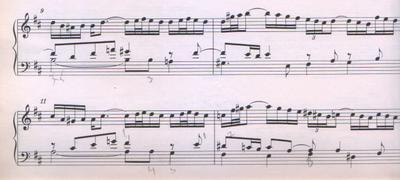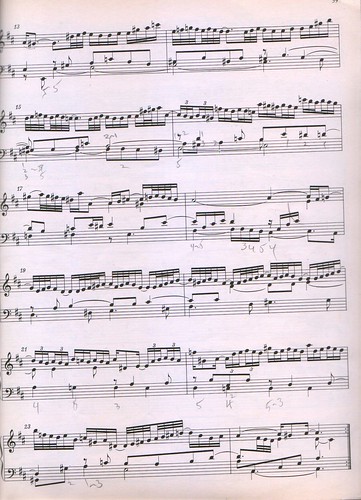But coming off six hours of intensive work on Bach partitas, I found my attention wandering, and I was not able to participate... so I took leave of my lovely dinner partners and headed up Amsterdam Avenue to my new favorite sushi restaurant--
(by the way, there is a point to this long story, I think)--
where it is possible, I have discovered repeatedly, to spend a surprising amount of money. I promptly ordered one of their best bottles of sake, and every special maki listed on the menu (only in New York does "today's special" not mean "on sale" but rather "you're going to get reamed"), and sat down with Henry James' The Golden Bowl. Though a table of Croatians seemed to be celebrating their ability to make noise a few tables away, this only bothered me briefly, and after a thimble or two of sake, I was astonishingly able and willing to immerse myself in James' enormous sentences (whose style I seem to be subconsciously--I promise!--emulating here).
I came upon the amazing scene where Charlotte--having embroiled herself in the devil's bargain of marriage to an American tycoon--is appearing in her full, moneyed glamour, for the first time, and conspicuously "going about" at a party, waiting rather theatrically for the Prince, her ex-lover, who is also her son-in-law (!). And as she stands there, mid-staircase, James brings full to bear the weight of his enormous perception, in one of those endless, nuanced, magnificently branching sentences:
The ordered revellers, rustling and shining, with sweep of train and glitter of star and clink of sword, and yet for all this but so imperfectly articulate, so vaguely vocal--the double stream of the coming and the going, flowing together where she stood, passed her, brushed her, treated her to much crude contemplation and now and then to a spasm of speech, an offered hand, even in some cases to an unencouraged pause; but she missed no countenance and invited no protection: she fairly liked to be, so long as she might, just as she was--exposed a little to the public, no doubt, in her unaccompanied state, but, even if it were a bit brazen, careless of queer reflexions on the dull polish of London faces, and exposed, since it was a question of exposure, to much more competent recognitions of her own.
I was amazed at how amazed I was, how in my James "zone" I felt. Admittedly, I have occasionally been prone to petty irritation with James, and what one might term, ungenerously, his pompous verbosity ... but as I stared lovingly at the octopus, tuna, and salmon in the display case, I savored the afterglow of each sentence as it sunk in, and the complications each seemed to add to the characters, bit by bit, like constructing an enormous edifice. Indeed, the characters were getting themselves in deeper and deeper (so to speak), and I-as-reader was also, snorkeling around in the murk of the unspoken tension of this most complicated love quadrangle. The sentences were complex but like life... constantly adding to both the answers and the unanswerables. I looked around, finally, to find myself the last person in the restaurant. The sake bottle also appeared to be empty. Nonetheless the owners seemed not to be annoyed or impatient; rather, their eyes seemed moist with gratitude and solicitude, perhaps in anticipation of my check.
How happy I was, reading James in the sushi place! But when I returned home, I became even happier. I had left the music open to the Allemande of the 4th Partita, barely readable in the glow of my lamp, and I sat and was too impatient to begin in the beginning, and so I began playing nine measures in, which is the beginning of a sequence:

Now, for some heavy lifting. As in certain James sentences, in lots of Bach one cannot know beforehand where the clauses will start and stop... one only knows the structure (the unit-to-be-repeated, the thread of relation) "in hindsight." Measures 9 and 10 "mean something," but only in bars 11 and 12, the reiterated, reworked version, does this meaning, does even the mere fact of 9 and 10 being a unit, become clear. And it (the meaning) is defined by difference. By the time you know the meaning, the direction of events has already changed; it is time for another paradigm shift. (Meaning built on quicksand). Bars 11 and 12 make a change at the midpoint (the "crux" of the phraselet, also the melodic peak)... and this change struck me quite forcefully that evening... had I really heard it properly for the first time? In place of the dominant seventh chord at the crux in bar 10, bar 12 substitutes a diminished seventh chord, an accident which (though clearly no accident) suddenly seemed to me a major event, a kind of "slippage" of meaning, a crack through which the piece had suddenly fallen, not to reemerge for some time.
And though the next measure (a dominant pedal) is no great surprise, and could have been reached by any manner of ways, the fact that it was reached by that particular, odd, awkwardly beautiful way seems to affect the course of events, not out of necessity, but out of association, like a difficult memory from one's life that keeps cropping up and influencing your subsequent decisions. This is the way I began to "explain" to myself the remaining unfolding of the first half of the Allemande: the odd, beautiful, dissonant mingling of major and minor in bar 14; also, the extraordinary deceptive cadence to F-natural in the bass of bar 15; and the two fascinating tritones at the beginning of bar 17 (in the left hand) which make the subsequent cadence a sort of triumph over harmonic adversity. And on and on.

The major and minor coexist so uneasily, so heartbreakingly... in their interaction the music courts ugliness, awkwardness, infelicity... and yet manages "to escape." The melody seems like a fragile, eroding trail between these two options. In bar 19, we seem to be freer of this past complication, the meaning seems released: ah, yes, a rising major sequence. Very beautiful. We might predict: it will rise, and peak, and flourish, and resolve into the cadence at the dominant. But (of course) the meaning slips again, in the second beat of measure 21. And for me, it was this association backwards, this sense of connection between all these "slipped" moments, that made it powerful, that made the sentence, as I played it, enormously consequential. Henry James, or at least my copy of The Golden Bowl, was sitting on the piano, listening. He might have observed yet another second thought, becoming, reluctantly, a generative first thought for a whole other line of enquiry, which, finally though suddenly, almost "accidentally" (the last, most fortunate, accident!) slips back into major, and resolves, succumbing to the compelling imperative of "always."
I stopped. I looked at the page.
This is really when the practicing pays off; when music and all its business seems quite worthwhile: when you "get" something, even if it might mostly vanish tomorrow, and might never make it out over the airwaves to your listeners, even if it may end up, finally, being something you only share between yourself and J.S. ... I shouldn't have begun by saying I lived "with" the dead. Rather, for that one sentence: I lived through the dead. Visions of Bach in his candlelight scribbling. That crusty old Lutheran might have stopped having more children in Heaven and taken a moment to give me, secular self-absorbed New Yorker, a little life.

10 comments:
Funny, I'm also working on that piece. The phrase structure is really intriguing. The bars fall into groups of four, but not really (as you said). You also gotta love that descending scale at the end of the first half that just keeps going and going and going... the G#/D chord that interrupts it at its last step is such a satisfying sonority after all the smooth stepwise voice leading that precedes it.
Ah, Saigon Grill, had a great meal there a couple years ago with Roberto Diaz. It was a great place, and I think the latest hour (11pm) that I've ever eaten an "actual" dinner (being a Portlander, not a NYC'er).
THANK YOU for this!
You see, I am so flippin' TIRED of seeing blog after blog filled with politicized N.O. stuff this week, that it's nice to remember that there is still another world out there.
No, we don't have our heads in the sand ignoring the Gulf disasters. I've made some pretty good donations to relief efforts this week, so my conscience is clear there. But thank heavens that I can see in your blog that someone else is also able to put it all in perspective, that the rest of life won't come to a grinding halt.
It may sound like effete astheticism but I do think that contemplating a mystery as perplexing and breathtaking as Bach opens a kind of humanity in the beholders that can deepen and transform the ways in which we engage with the mysteries of the world around us
Death was a spectre Bach looked square in the face with a kind of calm recognition stemming from his faith. His music, even instrumental, gives one a kind of resolution to act in the world with grace. It is a horrific, deadly, annihilating place, but Bach invites us to face its horror as a community whose existence manifests hope. Which he rendered in music that speaks more eloquently than any religion.
His eloquence speaks as naturally as the mere man who was immortalized by forgetting he was broadcasting when he watched the Hindenburgh explode exclaiming, "Oh, the Humanity!"
His music was an act of charity to our species. We little people can emulate him in our own compassion toward the people who face the abyss today.
Translation: Do what you can and must for the disaster victims but never feel foolish for keeping Bach alive in our hearts at a time like this. (whew) -r
lovely
Wow, you really do like Bach, eh. It's very odd reading these posts from people who actually play...I'm in school to learn to play like ya'll..i'm stuck on Chopin at the moment..College Music Professors can be so full of themselves, praise the Lord for order in something.
A couple of thoughts:
To what extent is the minor-major instability here (and elsewhere in JSB--F minor Fugue in Book I, e.g.)--a way of fooling around with the temperament of his keyboard instrument? how do these pieces sound on instruments tuned according to a different system?
Looking (as I think is always a good idea) to the vocal music for clues to Affekt, doesn't chromaticism usually evoke the fear (of death and judgment) that, in the Cantatas, is only conquered by faith? If this Allemande were a soprano aria with violin and oboe obligato, wouldn't it be about that--probably the first big aria, with a reassuring baritone aria in major coming later (after a recitative), just before the final chorale?
That was touching: thanks.
There's so much that can be seen in JSB! It's a wonder that never ceases to amaze me.
The most lovely post here. It's really wonderful to see people sharing their thoughts and analysis on the legacy left by the history's greatest composer given to the world by God. It has been the most enjoyable reading this entry. Thank you. =)
denk?!! where you at?! i need my denk fix... ;)
Post a Comment